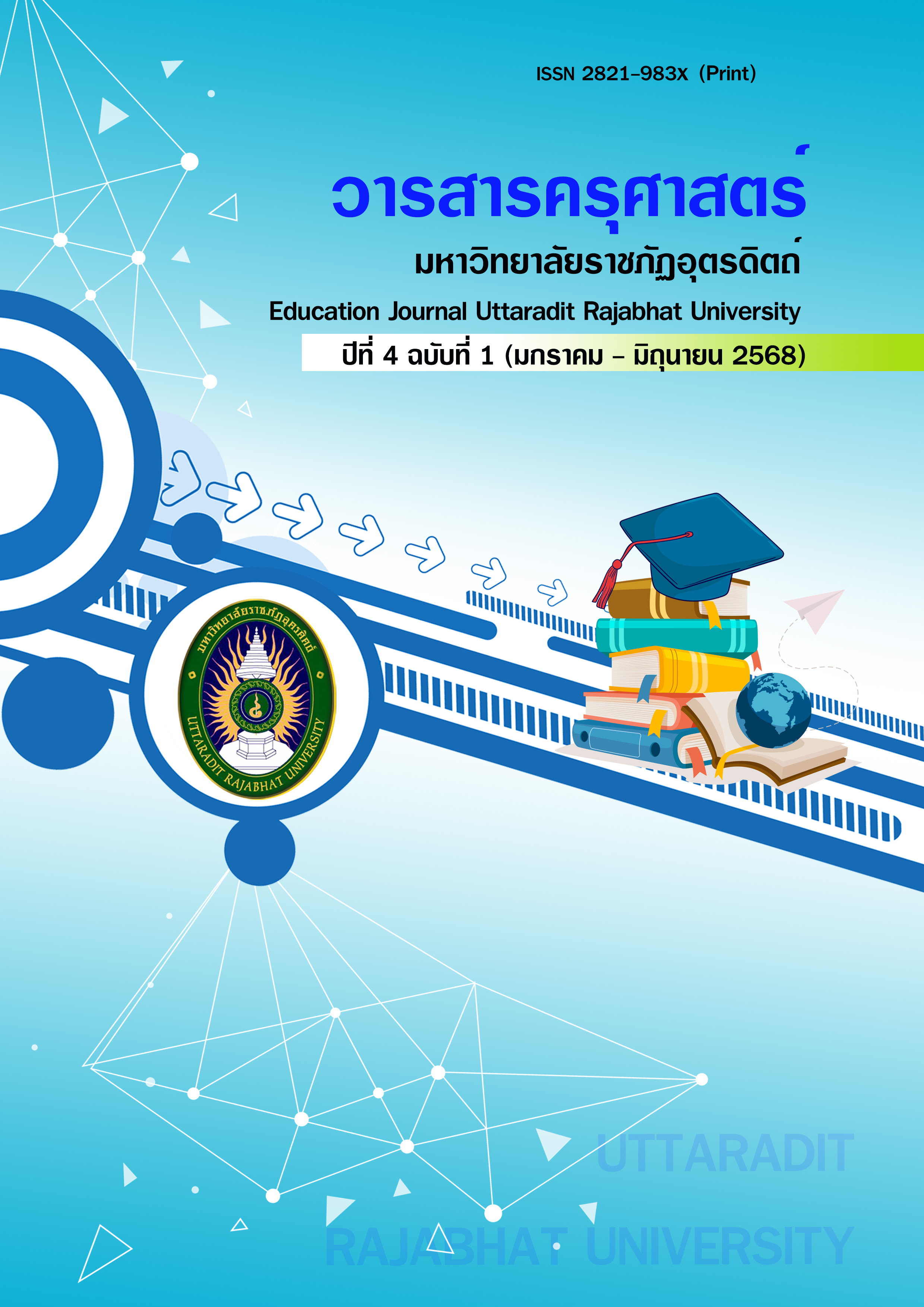Development of Mathematics Achievement in Calculus for Grade 12 Students Using Board Games Integrated with Flipped Classroom Approach and Skill Enhancement Exercises.
Main Article Content
Abstract
The objectives of this research were to: 1) develop board games integrated with flipped classroom concepts and skill enhancement exercises for teaching calculus in mathematics, 2) compare learning achievement before and after studying calculus using board games integrated with flipped classroom concepts and skill enhancement exercises, and 3) study the satisfaction of Grade 12 students after using board games integrated with flipped classroom concepts and skill enhancement exercises. The sample group consisted of 16 Grade 12 students from the Demonstration School of Uttaradit Rajabhat University, Mueang District, Uttaradit Province, in the first semester of the 2024 academic year, selected through cluster sampling. The instruments used for data collection were: 1) learning management manual, 2) pre-test, 3) post-test, and 4) student satisfaction questionnaire regarding learning management using board games integrated with flipped classroom concepts and skill enhancement exercises. The statistics used for data analysis were percentage, mean, standard deviation, Shapiro-Wilk test, and t-test.
The results of the study revealed that:
- The mathematics learning management manual for calculus using board games with flipped classroom approach and skill enhancement exercises met the 75/75 efficiency criteria, with scores during the learning process (E1) equal to 75.09 and post-test scores (E2) equal to 75.31.
- The Shapiro-Wilk test results showed that both pre-test and post-test scores had normal distribution (pre-test Sig = .273, post-test Sig = .338).
- The learning achievement of students who received instruction using board games with flipped classroom approach and skill enhancement exercises showed that the post-test mean score (= 15.06, S.D. = 1.57) was significantly higher than the pre-test mean score
(= 12.06, S.D. = 1.24) at the .05 significance level. - The satisfaction of students with the learning management using board games with flipped classroom approach and skill enhancement exercises was at the highest level
(= 4.77, S.D. = 0.45), with all evaluation items rated at the highest satisfaction level.
Keywords: Board games; Flipped classroom; Skill enhancement exercises; Calculus
Article Details

This work is licensed under a Creative Commons Attribution-NonCommercial-NoDerivatives 4.0 International License.
Faculty of Education Journal Uttaradit Rajabhat University It is a medium for disseminating research results. Academic work Any opinions expressed in the article are solely the personal opinions of the author. Faculty of Education Uttaradit Rajabhat University and the editorial team does not necessarily have opinions that are consistent with those expressed in the article in any way. and is not considered the responsibility of the Faculty of Education Uttaradit Rajabhat University and editorial team
References
ขวัญใจ เมฆสุวรรณ, วีระ วงศ์สรรค์ดร, และรสรินทร์ อรอมรรัตน์. (2565). การพัฒนาแบบฝึกเสริมทักษะการเขียนร้อยกรองกาพย์ยานี 11 โดยใช้วิธีการแบบร่วมมือ สำหรับนักเรียนชั้นมัธยมศึกษาปีที่ 5. วารสารบัณฑิตศาส์น มหาวิทยาลัยมหามกุฏราชวิทยาลัย, 20(2), 256-265.
เจนจิรา คณาจันทร์, คติยา แก้วคำสอน, ประภาพร หนองหารพิทักษ์, และปวีณา ขันธ์ศิลา. (2563). การศึกษาผลสัมฤทธิ์ทางการเรียน เรื่อง การประยุกต์ของอนุพันธ์ ของนักเรียนชั้นมัธยมศึกษาปีที่ 6 โดยการใช้โปรแกรม GeoGebra ประกอบการจัดกิจกรรมการเรียนรู้เพื่อแก้ปัญหาคณิตศาสตร์ตามกระบวนการแก้ปัญหาของโพลยา. วารสารวิทยาศาสตร์และวิทยาศาสตร์ศึกษา, 3(1), 73-83.
ชลธิชา วิมลจันทร์. (2563). การพัฒนากิจกรรมการเรียนรู้คณิตศาสตร์โดยใช้แนวคิดห้องเรียนกลับด้าน เรื่อง อัตราส่วน สำหรับนักเรียนชั้นมัธยมศึกษาปีที่ 1 [วิทยานิพนธ์ปริญญามหาบัณฑิต]. สกลนคร : มหาวิทยาลัยราชภัฏสกลนคร.
ตุลา ประทับ. (2565). การพัฒนาทักษะการแก้ปัญหาทางคณิตศาสตร์โดยใช้กิจกรรม MEAS ร่วมกับเกมกระดานสำหรับนักเรียนชั้นมัธยมศึกษาปีที่ 3 [วิทยานิพนธ์ปริญญามหาบัณฑิต]. กรุงเทพฯ : มหาวิทยาลัยธุรกิจบัณฑิตย์.
ทิพรัตน์ สิทธิวงศ์. (2564). การศึกษาผลของการใช้บอร์ดเกมเพื่อส่งเสริมการเรียนรู้ สำหรับนิสิตระดับปริญญาตรี คณะศึกษาศาสตร์ มหาวิทยาลัยนเรศวร. Journal of Education Naresuan University, 23(4), 187-200.
ทิศนา แขมมณี. (2560). ศาสตร์การสอน: องค์ความรู้เพื่อการจัดกระบวนการเรียนรู้ที่มีประสิทธิภาพ (พิมพ์ครั้งที่ 21). กรุงเทพฯ : สำนักพิมพ์แห่งจุฬาลงกรณ์มหาวิทยาลัย.
ธนัท เรืองพรรณกุล. (2566). การแก้ปัญหาการเรียนรู้วิชาคณิตศาสตร์ เรื่อง ร้อยละและอัตราส่วน โดยใช้แบบฝึกเสริมทักษะ สำหรับนักเรียนระดับชั้นประถมศึกษาปีที่ 6 โรงเรียนธนสิทธิ์อนุสรณ์. วารสารมหาจุฬานาครทรรศน์, 10(9), 137-144.
ธัชพล พลรัตน์, รุ่งฟ้า จันท์จารุภรณ์, และพิศุทธวรรณ ศรีภิรมย์ สิรินิลกุล. (2563). การศึกษาสภาพการจัดการเรียนการสอนคณิตศาสตร์ที่เกี่ยวข้องกับการใช้ตัวแบบเชิงคณิตศาสตร์เพื่อแก้ปัญหาสถานการณ์จริง เรื่อง การประยุกต์แคลคูลัส ระดับมัธยมศึกษาตอนปลาย. Veridian E-Journal, Silpakorn University ฉบับภาษาไทย มนุษยศาสตร์ สังคมศาสตร์ และศิลปะ, 12(5), 474-492.
ธิดาพร ผันผ่อน, ประภาพร หนองหารพิทักษ์, และปวีณา ขันธ์ศิลา. (2566). การสร้างบอร์ดเกมเพื่อพัฒนาผลสัมฤทธิ์ทางการเรียนคณิตศาสตร์ เรื่อง ทฤษฎีบทพีทาโกรัส สำหรับนักเรียนชั้นมัธยมศึกษาปีที่ 2. วารสารครุศาสตร์อุตสาหกรรม, 22(1), 99-109.
ธิติพงษ์ เดชะวงษ์. (2561). การพัฒนาผลสัมฤทธิ์ทางการเรียนวิชาคณิตศาสตร์ เรื่องลิมิตและความต่อเนื่องของฟังก์ชันของนักเรียนชั้นมัธยมศึกษาปีที่ 6 โรงเรียนมัธยมวัดด่านสำโรง โดยใช้แบบฝึกทักษะ. วารสารออนไลน์บัณฑิตศึกษา คณะศึกษาศาสตร์ มหาวิทยาลัยรามคำแหง.
นพพร ฉิมสาคร. (2565). การพัฒนารูปแบบการเรียนการสอนห้องเรียนกลับด้านร่วมกับการเรียนแบบรอบรู้เพื่อเสริมสร้างความสามารถในการกำกับตนเองสำหรับนักศึกษาระดับปริญญาบัณฑิต [วิทยานิพนธ์ปริญญามหาบัณฑิต]. นครปฐม : มหาวิทยาลัยศิลปากร.
นันทรัตน์ เกียรติศักดิ์โสภณ, และณัฐริกา สงสังข์. (2567). การพัฒนาบอร์ดเกมการศึกษาความจริงสื่อเสริม สำหรับการเรียนรู้โดยใช้เกมเป็นฐานเรื่องโปรแกรม Scratch ของนักเรียนระดับชั้นประถมศึกษาปีที่ 4. Journal of Science and Technology, Southeast Bangkok University, 4(2), 191-208.
ปาณัฐฐา ขุนรักษา, ทรงชัย อักษรคิด, และวันดี เกษมสุขพิพัฒน์. (2564). การศึกษาความสามารถในการแก้ปัญหาคณิตศาสตร์ เรื่องสมการเชิงเส้นตัวแปรเดียวของนักเรียนชั้นมัธยมศึกษาปีที่ 1 ด้วยการจัดการเรียนรู้โดยใช้บาร์โมเดล. วารสารศึกษาศาสตร์ปริทัศน์, 36(2), 154-166.
ปาริชาติ ชาชุมวงศ์. (2561). รายงานการพัฒนาแบบฝึกทักษะคณิตศาสตร์ เรื่อง อัตราส่วนและร้อยละ ชั้นมัธยมศึกษาปีที่ 2 (ฉบับปรับปรุง). สำนักงานเขตพื้นที่การศึกษามัธยมศึกษา เขต 22.
ร่มธรรม สถิตโกศล, และสิทธิพล อาจอินทร์. (2567). การพัฒนาความสามารถในการแก้ปัญหาและการคิดอย่างมีวิจารณญาณของนักเรียนชั้นมัธยมศึกษาปีที่ 4 ด้วยการจัดการเรียนรู้โดยใช้ปัญหาเป็นฐาน (PBL) ร่วมกับห้องเรียนกลับด้าน (Flipped Classroom). วารสารมนุษยศาสตร์และสังคมศาสตร์ มหาวิทยาลัยนครพนม, 14(3), 241-255.
เสถียรพงษ์ ดวงรัตเอกชัย. (2562). Game-based learning ทางเลือกสำหรับการศึกษาวิทยาศาสตร์ยุคใหม่. นิตยสาร สสวท., 47(216), 25-30.


